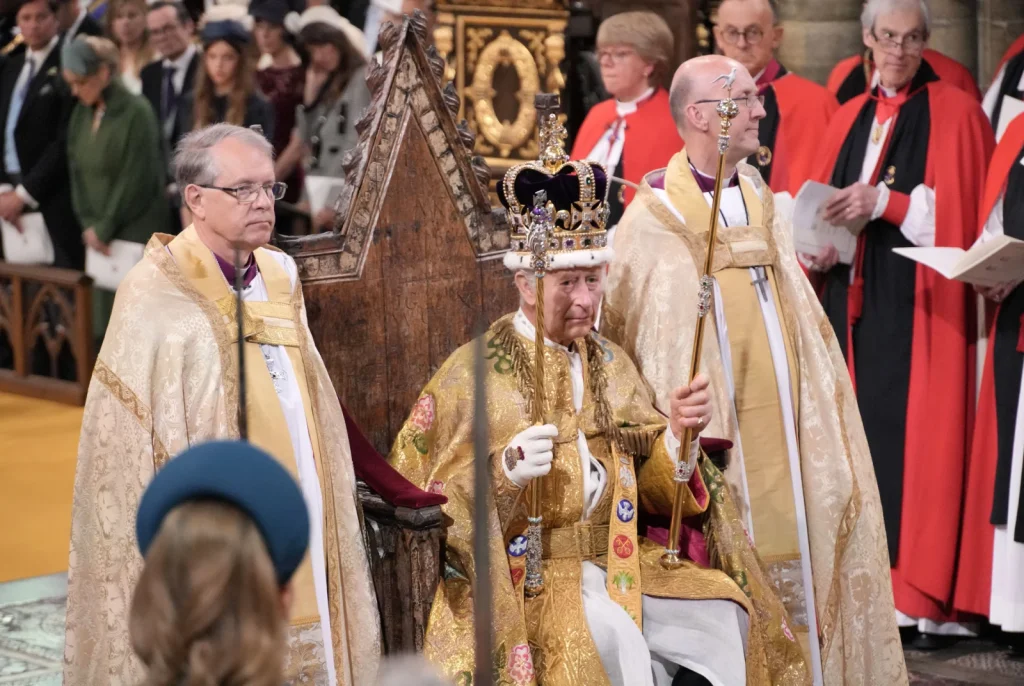Queen Elizabeth II reigned as the British monarch for just over 70 years, from 1952 until her death in 2022. She was ‘my’ Queen once I moved to England as a bride.
Britain is known for its polished rituals of pomp and circumstance – Trooping the Colour for the monarch’s birthday, changing guards at Buckingham Palace (cf. A.A.Milne’s poem), royal weddings, royal funerals – and coronations. The Queen’s oldest son, now known as King Charles III, got his big turn in the spotlight on a rainy 6 May 2023. His mother’s coronation was the first ever to be televised; Charles’ coronation was watched online in countries around the world – maybe you watched it. It was definitely a religious ceremony, a service of worship with holy communion and a coronation. Its traditional rituals, garments and accompanying regalia – orb, scepters, jewel-encrusted swords of justice and of mercy, historic crowns – are full of symbolism, and the service was full of solemn oaths, prayers and declarations. “I come not to be served, but to serve,” vowed Charles at the start of the ceremony.

The United Kingdom is alone in Europe in marking the accession of a new monarch with a coronation. The key elements mostly come from very long ago. I’ve learned some interesting things about the anointing, the oldest ritual of all and the most imbued with a sense of the sacred. The inspiration for this came from 1 Kings 1:45 in the Old Testament: “Zadok the priest and Nathan the prophet anointed Solomon king.” The holy oil to anoint Charles came from the Mount of Olives and was consecrated at the Church of the Holy Sepulchre in Jerusalem. The Archbishop of Canterbury noted the ‘deep historic link’ between the oil that crowned King Charles and that of biblical kings. Charles insisted on following his mother’s example and did not televise the anointing: the ancient throne he sat on was temporarily screened by embroidered panels, while Handel’s Zadok the Priest soared through Westminster Abbey. When the screen was removed, he was kneeling in a simple shirt before the high altar.
This ritual, and the fact that the British monarch is also the head of the Church of England, is where some of the solemnity of the service came from. The act is believed to empower him, through the grace of the Holy Spirit, with the ability to discharge his divinely appointed duties, particularly his ministry in defending the faith – or faiths, as Charles emphasised in his own coronation service. Though I am no royalist, I am interested in how the signification of a coronation relates to what the Writings say about kingship and the different levels of ‘the neighbour’ whom we are to love and respect.
As the new monarch, will King Charles III be a good representative of the Lord in how he reigns? Will he exemplify truthfulness and goodness for the citizens of his kingdom? Will he himself be a genuine neighbour? He seems to have laid some good foundations as the Prince of Wales. Time will tell how his time as king plays out.
———————-
“The neighbour, however, is not only [a person] in the singular number, but also [people] in the plural number; for a smaller or greater society, one’s country, the Church, the Lord’s kingdom, and the Lord Himself above all, is also the neighbour. They are the neighbour, to whom good ought to be done out of love. They also are the ascending degrees of the neighbour: for a society consisting of many is a neighbour in a higher degree than an individual person; one’s country is so in a still higher degree; the Church in a higher degree still; and, in a still higher degree, the kingdom of the Lord; but in the highest degree the Lord is the neighbour. These ascending degrees are like the steps of a ladder, at the top of which is the Lord.” The New Jerusalem and its Heavenly Doctrine 91
“All this shows what the neighbour is, namely that everyone is the neighbour according to the love which governs him; and he is truly the neighbour who is governed by love to the Lord and charity towards the neighbour, but in a different way for everyone. Thus it is the good itself with each one that is the determining factor.” Arcana Coelestia 2425 [4]
“…as is the case in any kingdom even today, kingship represents the Lord as regards Divine Truth.” Arcana Coelestia 5164
I enjoyed reading this interesting, insightful commentary on the coronation, Dale. – Affectionate wishes from your old, and I do mean old, teacher, “Miss Naomi”
Thanks Dale. I didn’t know some of these things. How very interesting. Wow UK tradition sure has deep roots. Remarkable. I loved the religious nature of the event. Even if I squirm at some of the old church’s doctrine about Tri-personal God, it seems that the intent was good, that Charles is serious and intentional about wanting to serve his people. Perhaps his fall from grace with the public and the pain in his earlier life had a good effect and propelled him to invest in ways he can be a benefit.